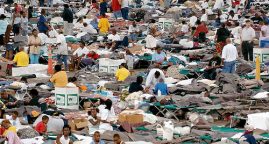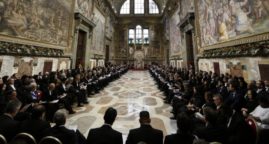The Pandemic Will Accelerate History Rather Than Reshape It
Article published on Foreign Affairs website on 04/07/2020 by Richard Haass
We are going through what by every measure is a great crisis, so it is natural to assume that it will prove to be a turning point in modern history. In the months since the appearance of COVID-19, the disease caused by the novel coronavirus, analysts have differed over the type of world the pandemic will leave in its wake. But most argue that the world we are entering will be fundamentally different from what existed before. Some predict the pandemic will bring about a new world order led by China; others believe it will trigger the demise of China’s leadership. Some say it will end globalization; others hope it will usher in a new age of global cooperation. And still others project that it will supercharge nationalism, undermine free trade, and lead to regime change in various countries—or all of the above.
But the world following the pandemic is unlikely to be radically different from the one that preceded it. COVID-19 will not so much change the basic direction of world history as accelerate it. The pandemic and the response to it have revealed and reinforced the fundamental characteristics of geopolitics today. As a result, this crisis promises to be less of a turning point than a way station along the road that the world has been traveling for the past few decades.
It is too soon to predict when the crisis itself will end. Whether in six, 12, or 18 months, the timing will depend on the degree to which people follow social-distancing guidelines and recommended hygiene; the availability of quick, accurate, and affordable testing, antiviral drugs, and a vaccine; and the extent of economic relief provided to individuals and businesses.
Yet the world that will emerge from the crisis will be recognizable. Waning American leadership, faltering global cooperation, great-power discord: all of these characterized the international environment before the appearance of COVID-19, and the pandemic has brought them into sharper-than-ever relief. They are likely to be even more prominent features of the world that follows.
POST-AMERICAN WORLD
One characteristic of the current crisis has been a marked lack of U.S. leadership. The United States has not rallied the world in a collective effort to confront either the virus or its economic effects. Nor has the United States rallied the world to follow its lead in addressing the problem at home. Other countries are looking after themselves as best they can or turning to those past the peak of infection, such as China, for assistance.
But if the world that follows this crisis will be one in which the United States dominates less and less—it is almost impossible to imagine anyone today writing about a “unipolar moment”—this trend is hardly new. It has been apparent for at least a decade.
To some degree, this is a result of what Fareed Zakaria described as “the rise of the rest” (and of China in particular), which brought a decline in the United States’ relative advantage even though its absolute economic and military strength continued to grow. But even more than that, it is a result of faltering American will rather than declining American capacity. President Barack Obama oversaw a pullback from Afghanistan and the Middle East. President Donald Trump has employed mostly economic power to confront foes. But he has essentially ended the U.S. presence in Syria, and seeks to do the same in Afghanistan, and, perhaps more significant, has shown little interest either in alliances or in maintaining the United States’ traditional leading role in addressing major transnational issues.
The prospect of this change was a big part of the appeal of Trump’s “America first” message, which promised that the United States would be stronger and more prosperous if it did less abroad and focused its energies on domestic issues. Implicit in this view was the assumption that much of what the United States did in the world was wasteful, unnecessary, and unconnected to domestic well-being. For many Americans, the pandemic will likely reinforce this view despite the fact that it should instead highlight how domestic well-being is affected by the rest of the world; the United States, they will say, will have to focus on righting itself and devote resources to needs at home rather than abroad, to butter rather than guns. That is a false choice, as the country needs and can afford both, but it is likely to be argued all the same.
Just as consequential as U.S. policy choices is the power of America’s example. Long before COVID-19 ravaged the earth, there had already been a precipitous decline in the appeal of the American model. Thanks to persistent political gridlock, gun violence, the mismanagement that led to the 2008 global financial crisis, the opioid epidemic, and more, what America represented grew increasingly unattractive to many. The federal government’s slow, incoherent, and all too often ineffective response to the pandemic will reinforce the already widespread view that the United States has lost its way.
ANARCHICAL SOCIETY
A pandemic that begins in one country and spreads with great velocity around the world is the definition of a global challenge. It is also further evidence that globalization is a reality, not a choice. The pandemic has ravaged open and closed countries, rich and poor, East and West. What is missing is any sign of a meaningful global response. (Newton’s law—that for every action there is an opposite and equal reaction—has apparently been suspended.) The near irrelevance of the World Health Organization, which should be central to meeting the threat at hand, speaks volumes to the poor state of global governance.
But while the pandemic has made this reality especially obvious, the underlying trends long preceded it: the emergence of global challenges that no country, no matter how powerful, can successfully contend with on its own—and the failure of global organizations to keep up with these challenges. Indeed, the gap between global problems and the capacity to meet them goes a long way toward explaining the scale of the pandemic. The sad but inescapable truth is that although the phrase “international community” is used as if it already existed, it is mostly aspirational, applying to few aspects of geopolitics today. This will not change anytime soon.
The principal responses to the pandemic have been national or even subnational, not international. And once the crisis passes, the emphasis will shift to national recovery. In this context, it is hard to see much enthusiasm for, say, tackling climate change, particularly if it remains viewed—incorrectly—as a distant problem that can be shelved in favor of addressing more immediate ones.
One reason for this pessimism is that cooperation between the world’s two most powerful countries is necessary to tackle most global challenges, yet U.S.-Chinese relations have been deteriorating for years. The pandemic is exacerbating friction between the two countries. In Washington, many hold the Chinese government responsible, thanks to its weeks of cover-up and inaction, including failing to promptly lock down Wuhan, the city where the outbreak started, and allowing thousands of infected people to leave and spread the virus farther. China’s attempt now to portray itself as offering a successful model for coping with the pandemic and to use this moment as an opportunity to expand its influence around the world will only add to American hostility. Meanwhile, nothing about the current crisis will change China’s view that the U.S. presence in Asia is a historical anomaly or reduce its resentment of U.S. policy on a range of issues, including trade, human rights, and Taiwan.
The idea of “decoupling” the two economies had gained considerable traction before the pandemic, driven by fears in the United States that it was becoming too dependent on a potential adversary for many essential goods and overly susceptible to Chinese espionage and intellectual property theft. The impetus to decouple will grow as a result of the pandemic, and only in part because of concerns about China. There will be renewed focus on the potential for interruption of supply chains along with a desire to stimulate domestic manufacturing. Global trade will partly recover, but more of it will be managed by governments rather than markets.
The resistance across much of the developed world to accepting large numbers of immigrants and refugees, a trend that had been visible for at least the past half decade, will also be intensified by the pandemic. This will be in part out of concern over the risk of importing infectious disease, in part because high unemployment will make societies wary of accepting outsiders. This opposition will grow even as the number of displaced persons and refugees—already at historic levels—will continue to increase significantly as economies can no longer support their populations.
The result will be both widespread human suffering and greater burdens on states that can ill afford them. State weakness has been a significant global problem for decades, but the economic toll of the pandemic will create even more weak or failing states. This will almost certainly be exacerbated by a mounting debt problem: public and private debt in much of the world was already at unprecedented levels, and the need for government spending to cover health-care costs and support the unemployed will cause debt to skyrocket. The developing world in particular will face enormous requirements it cannot meet, and it remains to be seen whether developed countries will be willing to provide help given demands at home. There is a real potential for aftershocks—in India, in Brazil and Mexico, and throughout Africa—that could interfere with global recovery.
The spread of COVID-19 to and through Europe has also highlighted the loss of momentum of the European project. Countries have mostly responded individually to the pandemic and its economic effects. But the process of European integration had run out of steam long before this crisis—as Brexit demonstrated especially clearly. The principal question in the post-pandemic world is how much the pendulum will continue to swing from Brussels to national capitals, as countries question whether control over their own borders could have slowed the virus’s spread.
The pandemic is likely to reinforce the democratic recession that has been evident for the past 15 years. There will be calls for a larger government role in society, be it to constrain movement of populations or provide economic help. Civil liberties will be treated by many as a casualty of war, a luxury that cannot be afforded in a crisis. Meanwhile, threats posed by illiberal countries such as Russia, North Korea, and Iran will still exist once the pandemic does not; indeed, they may well have increased while attention was trained elsewhere.
A WORLD IN EVEN GREATER DISARRAY
More than three years ago, I published a book titled A World in Disarray. It described a global landscape of increased great-power rivalry, nuclear proliferation, weak states, surging refugee flows, and growing nationalism, along with a reduced U.S. role in the world. What will change as a result of the pandemic is not the fact of disarray but the extent.
Ideally, the crisis would bring renewed commitment to building a more robust international order, much as the cataclysm of World War II led to arrangements that promoted peace, prosperity, and democracy for nearly three-quarters of a century. Such an order would include greater cooperation to monitor outbreaks of infectious diseases and deal with their consequences, as well as greater willingness to address climate change, set rules for cyberspace, assist forced migrants, and tackle proliferation and terrorism.
But there is little reason to believe the past will repeat itself after this latest global calamity. The world today is simply not conducive to being shaped. Power is distributed in more hands, both state and nonstate, than ever before. Consensus is mostly absent. New technologies and challenges have outpaced the collective ability to contend with them. No single country enjoys the standing the United States did in 1945.
What is more, this United States is not currently disposed to take on a leading international role, the result of fatigue brought on by two long wars in Afghanistan and Iraq and rising needs at home. Even if a foreign policy “traditionalist” such as former Vice President Joseph Biden wins the November presidential election, resistance from Congress and the public will prevent the full-scale return of an expansive U.S. role in the world. And no other country, not China or anyone else, has both the desire and the ability to fill the void the United States has created.
After World War II, the need to meet the looming communist threat galvanized the American public to support their country in assuming a leading role around the world. Former Secretary of State Dean Acheson famously said that the government had to make arguments “clearer than truth” to get the American people and Congress to buy into the effort to contain the Soviet Union. Some analysts suggest that invoking the threat of China could similarly galvanize public support today, but a foreign policy based on opposing China is hardly suited to addressing the global challenges that shape today’s world. Meanwhile, appealing to the American people to put tackling those global problems at the heart of U.S. foreign policy will continue to be a tough sell. Accordingly, the more relevant precedent to consider may be not the period following World War II but the period following World War I—an era of declining American involvement and mounting international upheaval. The rest, as they say, is history.
Related Articles
Participants at UN conference examine human mobility in an era of climate change
11/08/2017. The number of disaster displacements amounted to 25.3 million, according to figures released by the Norwegian Refugee Council.
What is the role of philanthropy in Covid times?
05/25/2020. Private generosity is on the rise. But while it can inspire state actors, it cannot replace them.
Address of pope Francis To the Diplomatic Corps
Pope Francis held on 8 January 2018 his greetings to the diplomatic corps in the Royal Hall of the Vatican Apostolic Palace.





